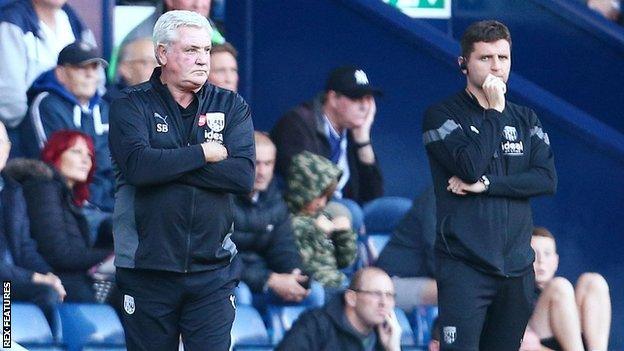Steve Bruce: West Bromwich Albion part company with manager
- Published
- comments

Steve Bruce had son Alex as part of his backroom team at The Hawthorns
West Bromwich Albion have parted company with manager Steve Bruce after eight months in charge.
The 61-year-old ex-Manchester United defender left following the Baggies' home draw with Luton Town on Saturday.
That kept them in the Championship relegation zone, in 22nd, their lowest league position in more than 20 years.
The backroom staff of Steve Agnew, Stephen Clemence and Alex Bruce have also left West Brom, with under-21 coach Richard Beale named interim boss.
Bruce was appointed as Baggies manager on 3 February as part of a change of structure at The Hawthorns that saw the departure of head coach Val Ismael, the appointment of Ron Gourlay as chief executive and club owner Guochuan Lai, the controlling shareholder, becoming Albion chairman.
In his 24 years in management, Bruce has had plenty of success, winning promotion from the Championship to the Premier League four times - twice with both Birmingham City and Hull City.
But, having enjoyed four months off following the miserable end to his time at Newcastle, a job he said at the time would probably be his last, he simply failed to relight the Albion fire.
The Baggies won just eight of his 32 games in charge.
Last Tuesday's 1-0 defeat at Preston was only their fourth in the league this season. But they have now drawn eight of their 13 league games and won just once.
His final match in charge was a goalless draw at home against Luton, leaving the Baggies eight games without a league victory
Late in the game disenfranchised Baggies fans made their thoughts on Bruce's position at the club known, with loud chants of 'Bruce out' and 'you don't know what you're doing' heard around The Hawthorns.
After the match, Bruce defended his position following the persistent calls for his sacking.
"I've been in this a long, long time. If you've been doing it for 1,000 games you'd like to think you know what you're doing," he told BBC Radio WM.
"Because I hear 'you don't know what you're doing', does it mean I'm going to walk out? No is the answer. Whatever happens above me is for other people to decide, I will carry on until I know different - I'm determined to turn the club around."
The hierarchy at West Brom chose to give the ex-Newcastle, Hull, Aston Villa and Birmingham boss less than two days more in the job.
"The club would like to place on record its thanks to Steve Bruce and his coaching staff for their efforts since arriving in February," said a statement., external
"The process of recruiting a new manager is now under way and an appointment will be confirmed in due course."
Results meant Bruce 'had to go' - analysis

The withdrawal of Grady Diangana late on in Saturday's draw with Luton led to part of The Hawthorns crowd turning against Bruce
BBC Radio WM's West Brom commentator Rob Gurney
Much like with one of his predecessors, Sam Allardyce, the West Bromwich Albion job could have forced Steve Bruce into retirement.
Fans were largely underwhelmed when he first arrived, but things had got so toxic in the final few weeks of Valerien Ismael's ill-fated reign, that it was a case of "anyone but Val".
Bruce admitted he tried to change too much, too soon when he arrived, so it took six games for his first win; 2-0 at Hull in early March, by which time early talk of still pushing for the top two and even the top six was quickly dissipating.
Fifth when he replaced Ismael, Bruce's Albion ended up 10th, eight points away from the play-off places.
Summer optimism looked well-placed when Jed Wallace, John Swift and Okay Yokuslu agreed to join on frees, and some of the football under Bruce was easy on the eye - the draws at home to Watford and Burnley, and the one big win this season against Hull - but things took another significant turn for the worse on transfer deadline day.
Josh Onomah and Steven Alzate - from Fulham and Brighton respectively - were both lined up; Onomah even spent the whole day at the Baggies' training ground. But neither materialised due to various "paperwork issues".
Bruce was clearly angry, but vowed to soldier on. Free agents Erik Pieters, Martin Kelly and Tom Rogic all arrived to bolster the squad.
But results - the commodity that all managers are judged on - continued to elude Bruce.
Albion supporters have been incredibly tolerant of their under-achieving football club and its dormant, disinterested, distant ownership.
But when fans' favourites Brandon Thomas-Asante - an energetic acquisition from League Two - and Grady Diangana were withdrawn towards the end of the Luton game, that tolerance evaporated.
"You don't know what you're doing" and "Bruce Out" then rang round the stadium, making the manager's position untenable.
Bruce insisted to me afterwards that both players were injured, but his tone and air of defiance didn't quite ring true this time.
Just 11 points from 13 matches this season; seven wins in 30 Championship matches overall tells its own story. He had to go.
But the bigger question now, aside from who replaces Bruce, is what happens to chief executive Ron Gourlay?
He hand-picked Bruce back in February, as the only candidate for the job, which with the manager's departure, now seriously compromises his credibility and authority.
While relief amongst the vast majority of the Albion supporters might be the overriding emotion, there's much that still needs to be done to get a once-proud football club back on the right path again.